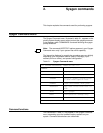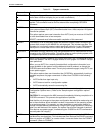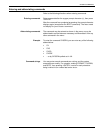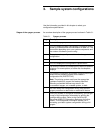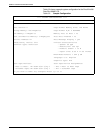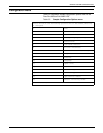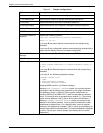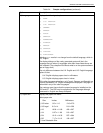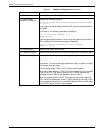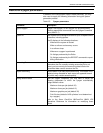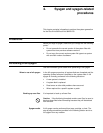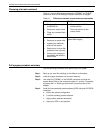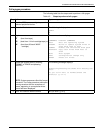
SAMPLE SYSTEM CONFIGURATIONS
3-4 XEROX DOCUPRINT 96/DOCUPRINT 96MX LPS SYSTEM GENERATION GUIDE
Table 3-4. Sample configurations
Option Description
0) None Returns you to the base system configuration display screen.
1) Full memory test Determines the amount of system memory test at power on.
2) Auto boot Determines whether auto boot is enabled at power on.
3) Message display Determines whether boot diagnostic messages display at power on.
4) Shared disk Adds or removes the shared disk option.
5) MICR mode default Adds or removes the MICR mode default option.
6) On-line interface (if
installed)
Displays the following question:
DOES THIS SYSTEM HAVE AN ONLINE INTERFACE?
ENTER ’Y’ OR ’N’.
If you enter N, the online feature is removed from the system being
generated.
If you enter Y, the configuration options are automatically selected by the
system and the display returns to the base configuration.
7) Xerox Print Service
Manager
Adds or removes the DocuPrintServer (formerly XPSM).
8) Kanji Adds or removes Kanji.
9) Ethernet (if installed) Displays the following question:
IS THIS SYSTEM CONNECTED TO A XEROX ETHERNET? ENTER ’Y’
OR ’N’.
If you enter N, the Ethernet feature is removed from the system being
generated.
If you enter Y, the following suboptions display:
ETHERNET CHANGE LIST:
1) NONE
2) READ PRINTER’S ADDRESS
3) ETHERNET NETWORK ADDRESS
Selecting NONE results in no Ethernet changes.
Selecting READ PRINTER’S ADDRESS results in the printing system
providing its internal address as a parameter to the sysgen processor.
This address is shown in table 3-2, Base system configuration for
DocuPrint 96/DocuPrint 96MX LPS, in both hexadecimal and decimal
format. The decimal value is preceded by an asterisk (*). (The printing
system internal address is set by Xerox at the time of manufacture.)
Selecting ETHERNET NETWORK ADDRESS results in a prompt for the
address of the Ethernet network. You may enter this address in either
hexadecimal or decimal form. For a decimal value, enter an asterisk
followed by the address (for example, *355). A value not preceded by an
asterisk is assumed to be hexadecimal. (The network address is assigned
by Xerox. Consult your network system administrator for the correct
assignment.)




